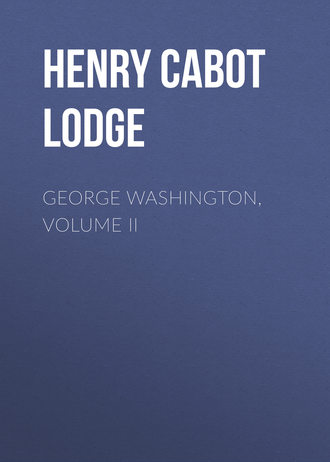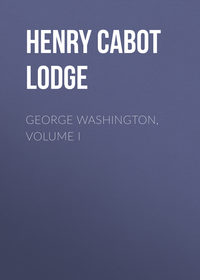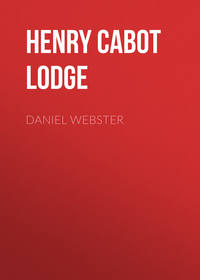 полная версия
полная версияGeorge Washington, Volume II
In all this perplexity, however, one thing was now clear to Washington. There could not longer be any doubt that the western troubles must be put down vigorously and by the armed hand. Even while he was negotiating in the north and south, therefore, he threw himself heart and soul into the preparation of St. Clair's expedition, pushing forward all necessary arrangements, and planning the campaign with a care and foresight made possible by his military ability and by his experience as an Indian fighter. While the main army was thus getting ready, two lesser expeditions, one under Scott and one under Wilkinson, were sent into the Indian country; but beyond burning some deserted villages and killing a few stray savages both were fruitless.
At last all was ready. St. Clair had an interview with Washington, in which the whole plan of campaign was gone over, and especial warning given against ambuscades. He then took his departure at once for the west, and late in September left Cincinnati with some two thousand men. The plan of campaign was to build a line of forts, and accordingly one named Fort Hamilton was erected twenty-four miles north on the Miami, and then Fort Jefferson was built forty-four miles north of that point. Thence St. Clair pushed slowly on for twenty-nine miles until he reached the head-waters of the Wabash. He had been joined on the march by some Kentucky militia, who were disorderly and undisciplined. Sixty of them promptly deserted, and it became necessary to send a regiment after them to prevent their plundering the baggage trains. At the same time some Chickasaw auxiliaries, with the true rat instinct, deserted and went home. Nevertheless St. Clair kept on, and finally reached what proved to be his last camp, with about fourteen hundred men. The militia were on one side of the stream, the regulars on the other. At sunrise the next day the Indians surprised the militia, drove them back on the other camp, and shattered the first line of the regulars. The second line stood their ground, and a desperate fight ensued; but it was all in vain. The Indians charged up to the guns, and, though they were repulsed by the bayonet, St. Clair, who was ill in his tent, was at last forced to order a retreat. The retreat soon became a rout, and the broken army, leaving their artillery and throwing away their arms, fled back to Fort Jefferson, where they left their wounded, and hurried on to their starting-point at Fort Washington. It was Braddock over again. General Butler, the second in command, was killed on the field, while the total loss reached nine hundred men and fifty-nine officers, and of these six hundred were killed. The Indians do not appear to have numbered much more than a thousand. No excuse for such a disaster and such murderous slaughter is possible, for nothing but the grossest carelessness could have permitted a surprise of that nature upon an established camp. The troops, too, were not only surprised, but apparently utterly unprepared to fight, and the battle was merely a wild struggle for life.
Washington was above all things a soldier, and his heart was always with his armies whenever he had one in the field. In this case particularly he hoped much, for he looked to this powerful expedition to settle the Indian troubles for a time, and give room for that great western movement which always was in his thoughts. He therefore awaited reports from St. Clair with keen anxiety, but in this case the ill tidings did not attain their proverbial speed. The battle was fought on November 4, and it was not until the close of a December day that the officer carrying dispatches from the frontier reached Philadelphia. He rode at once to the President's house, and Washington was called out from dinner, where he had company. He remained away some time, and on returning to the table said nothing as to what he had heard, talked with every one at Mrs. Washington's reception afterwards, and gave no sign. Through all the weary evening he was as calm and courteous as ever. When the last guest had gone he walked up and down the room for a few minutes and then suddenly broke out: "It's all over—St. Clair's defeated—routed; the officers nearly all killed, the men by wholesale; the rout complete—too shocking to think of—and a surprise into the bargain." He paused and strode up and down the room; stopped again and burst forth in a torrent of indignant wrath: "Here on this very spot I took leave of him; I wished him success and honor; 'You have your instructions,' I said, 'from the secretary of war; I had a strict eye to them, and will add but one word—Beware of a surprise! I repeat it—beware of a surprise! You know how the Indians fight us.' He went off with that as my last solemn warning thrown into his ears. And yet, to suffer that army to be cut to pieces, hacked, butchered, tomahawked, by a surprise, the very thing I guarded him against! O God, O God, he's worse than a murderer! How can he answer it to his country! The blood of the slain is upon him, the curse of widows and orphans, the curse of Heaven!"
His secretary was appalled and silent, while Washington again strode fiercely up and down the room. Then he sat down, collected himself, and said, "This must not go beyond this room." Then a long silence. Then, "General St. Clair shall have justice. I looked hastily through the dispatches, saw the whole disaster, but not all the particulars; I will receive him without displeasure; I will hear him without prejudice; he shall have full justice." The description of this scene by an eye-witness has been in print for many years, and yet we find people who say that Washington was cold of heart and lacking in human sympathy. What could be more intensely human than this? What a warm heart is here, and what a lightning glimpse of a passionate nature bursting through silence into burning speech! Then comes the iron will which has mastered all the problems of his life. "He shall have full justice;" and St. Clair had justice. He had been an unfortunate choice, but as a Revolutionary soldier and governor of the Northwest Territory his selection had been natural. He had never been a successful general, for it was not in him to be so. Something he lacked, energy, decision, foresight, it matters not what. But at least he was brave. Broken by sickness, he had displayed the utmost personal courage on that stricken field; and for this Washington would always forgive much. He received the unfortunate general kindly. He could not order a court martial, for there were no officers of sufficient rank to form one; but he gave St. Clair every opportunity for vindication, and a committee of Congress investigated the campaign and exculpated the leader. His personal bravery saved him and his reputation, but nothing can alter the fact that the surprise was unpardonable and the disaster awful.
Immediate results of the St. Clair defeat were not so bad as might have been expected. Panic, of course, ran rampant along the frontier, reaching even to Pittsburg; but the Indians failed to follow up their advantage, and did not come. Still the alarm was there, and Pennsylvania and Virginia ordered troops to be raised, while Congress also took action. Another increase of the army was ordered, with consequent increase of appropriation, so that this Indian victory entered at this point into the great current of the financial policy, and thus played its part in the events on which parties were dividing, and history was being made.
No matter what happened, however, there was to be neither lingering nor delay in this business. The President set to work at once to organize a fresh army, and fight out a settlement of the troubles. His first thought for a new commander was of Henry Lee of Virginia, but considerations of rank deterred him. He then selected and appointed Wayne, who recently had got into politics and been deprived, on a contested election, of his seat in the House. No little grumbling ensued over this appointment, especially in Virginia, but it was unheeded by the President, and its causes now are not very clear. The event proved the wisdom of the choice, as so often happened with Washington, and it is easy to see the reason for it. Wayne was one of the shining figures of our Revolution, appealing strongly to the imagination of posterity. He was not a great general in the highest sense, but he was a brilliant corps-commander, capable of daring feats of arms like the storming of Stony Point. He was capable also of dashing with heedless courage into desperate places, and incurring thereby defeat and consequent censure, but escaping entire ruin through the same quickness of action which had involved him in trouble. He was well fitted for the bold and rapid movement required in Indian warfare, and with him Washington put well-chosen subordinates, selected evidently for their fighting capacity, for he clearly was determined that this should be at all events a fighting campaign.
Wayne, after his appointment, betook himself to Pittsburg, and proceeded with characteristic energy to raise and organize his army, a work of no little difficulty because he wished to have picked men. Washington did all that could be done to help him, and at the same time pushed negotiations with admirable patience, but with very varying success. Kirkland brought chiefs of the Six Nations to Congress with good results, and the Cherokees were pacified by additional presents. On the other hand, the Creeks were restless, stirred up always by Spain, and two brave officers, sent to try for peace with the western tribes, were murdered in cold blood. Nevertheless, treaties were patched up with some of them, and a great council was held in the fall of 1792, the Six Nations acting as mediators, which resulted in a badly kept armistice, but in nothing of lasting value. The next year Congress passed a general act regulating trade and intercourse with the Indians, and Washington appointed yet another commission to visit the northwestern tribes, more to satisfy public opinion than with any hope of peace. Indeed, these commissioners never succeeded in even meeting the Indians, who rejected in advance all proposals which would not concede the Ohio as the boundary. English influence, it was said, was at the bottom of this demand, and there seems to be little doubt that such was the case, for England and France were now at war, and England thereupon had redoubled her efforts to injure the United States by every sort of petty outrage both on sea and land. This masterly policy had perhaps reasons for its existence which pass beyond the average understanding, but, so far as any one can now discover, it seems to have had no possible motive except to feed an ancient grudge and drive the country into the arms of France. Carried on for a long time in secret, this Indian intrigue came to the surface in a speech made by Lord Dorchester to the western tribes, in which he prophesied a speedy rupture with the United States and urged his hearers to continue war. It is worth remembering that for five years, covertly or openly, England did her best to keep an Indian war with all that it implied alive upon our borders,—the borders of a friendly nation with whom she was at peace.
But while Washington persistently negotiated, he as persistently prepared to fight, not trusting overmuch either the savages or the English. Wayne, with similar views, moved his army forward in the autumn of 1793 to a point six miles beyond Fort Jefferson, and then went into winter quarters. Early in the spring of 1794 he was in motion again and advanced to St. Clair's battlefield, where he built Fort Recovery, and where he was attacked by the Indians, whom he repulsed after two days' fighting. He then marched in an unexpected direction and struck the central villages at the junction of the Au Glaize and Maumee. The surprised savages fled, and Wayne burned their village, laid waste their extensive fields, and built Fort Defiance. To the Indians, who had retreated thirty miles down the Maumee to the shelter of a British post, he sent word that he was ready to treat. The reply came back asking for a delay of ten days; but Wayne at once advanced, and found the Indians prepared for battle near the English fort. The ground was unfavorable, especially for cavalry, but Wayne made good arrangements and attacked. The Indians gave way before the bayonet, and were completely routed, the American loss being only one hundred and seven men. The army was not averse to storming the English fort; but Wayne, with unusual caution, contented himself with a sharp correspondence with the commandant, and then withdrew after a most successful campaign. The next year, strengthened by his victory and by the surrender of the British posts under the Jay treaty, Wayne made a treaty with the western tribes by which vast tracts of disputed territory were ceded to the United States, and peace was established in that long troubled region.
On the southern frontier there were no such fortunate results. While Washington was negotiating and fighting in the north and west, all his patient efforts were frustrated in the south by the conduct of Georgia. The borderers kept assailing the Indians, peaceful tribes being generally chosen for the purpose; and the State itself broke through and disregarded all treaties and all arrangements made by the United States. The result was constant disquiet and chronic war, with the usual accompaniments of fire, murder, and pillage.
On the whole, however, when Washington left the presidency, his Indian policy had been a marked success. In place of uncertainty and weakness, a definite general system had been adopted. The northern and western tribes had been beaten and pacified, and the southern incursions and disorders had been much checked. The British posts, the most dangerous centres of Indian intrigue, had been abandoned, and the great regions of the west and northwest had been opened to the tide of settlement. These results were due to a well-defined plan, and above all to the persistent vigor which pushed steadily forward to its object without swinging, as had been done before, between feverish and often misdirected activity on the one side and complete and feeble inaction on the other. They were achieved, too, amid many difficulties, for there was anything but a unanimous support of the government in its Indian affairs. The opposition grumbled at the expense, and said that money needlessly raised by taxation was squandered in Indian wars, while the great body of the people, living safely along the eastern coast, thought but little about the frontier. Some persons took the sentimental view and considered the government barbarous to make causeless war. Others believed that altogether too much of the public time and money were wasted in looking after outlying settlements. The borderers themselves, on the other hand, thought that the general government was in league with the savages, and broke through treaties, and destroyed so far as they could the national policy. St. Clair was hissed and jeered as he traveled home, but a wakeful opposition turned from the unsuccessful general to a vain attempt to prove that ambushed savages and sleeping sentries were due to a weak war department and a corrupt and inefficient treasury. The mass of moderate people, no doubt, desired tranquillity on the frontier, and sustained the President's labors for that end, but for the most part they were silent. The voices that Washington heard most loudly joined in a discordant chorus of disapproval around his Indian policy. No one understood that here was an important part of a scheme to build up a nation, to make all the movements of the United States broad and national, and to open the vast west to the people who were to make it theirs. Washington heard all the criticism and saw all the opposition, and still pressed forward to his goal, not attaining all he wished, but fighting in a very clear and manful spirit, and not laboring in vain.
The Indian question in its management touched, as has been seen, at various points our financial policy and our foreign relations, on which the history of the country really turned in those years. The latter had not risen to their later importance when the government began, but the former was knocking importunately at the door of Congress when it first assembled. The condition of affairs is soon told. The Revolution narrowly escaped shipwreck on the financial reefs, and the shaky government of the confederation had there gone to pieces. The country, as a political organism, was bankrupt. It owed sums of money, which were vast in amount for those days, both at home and abroad, and it could not pay these debts, nor was there any provision for them. All interest was in arrears, there were no means provided for meeting it, and the national credit everywhere was dishonored and gone. The continental currency had disappeared, and the circulating medium was represented by a confused jumble of foreign coins and worthless scrip. Many of the States were up to their eyes in schemes of inflation, paper money, and repudiation. There was no money in the treasury to pay the ordinary charges of government; there was no revenue and no policy for raising one, or for funding the debt. This picture is darkly drawn, but it is not exaggerated. That high spirit of public honor, which seventy-five years later rose above the ravages of war and the temptings of dishonesty to pay the debt and the interest, dollar for dollar in gold, seemed in 1789 to be wellnigh extinct. But it was not dead. It was confused and overclouded in the minds of the people, but it was still there, and it was strong, clear, and determined in Washington and those who followed him.
Congress grappled with the financial difficulties in the most courageous and honest way, but it struggled with them rather helplessly despite its good disposition. It could lay taxes in one way or another so as to get money, but this was plainly insufficient. It could not formulate a coherent policy, which was the one essential thing, nor could it settle the thousand and one perplexing questions which hedged the subject on every side. The members turned, therefore, with a sigh of relief to the new Secretary of the Treasury, asked him the questions which were troubling them, and having directed him to make various reports, adjourned.
The result is well known. The great statesman to whom the task was confided assumed it with the boldness and ease of conscious power, and when Congress reassembled it listened to the first report on the public credit. In that great state paper all the confusions disappeared, and in terse sentences an entire scheme for funding the debt, disposing of the worthless currency, and raising the necessary revenue came out clear and distinct, so that all men could comprehend it. The provision for the foreign debt passed without resistance. That for the domestic debt excited much debate, and also passed. Last came the assumption of the state debts, and over that there sprang up a fierce struggle. It was carried by a narrow majority, and then defeated by the votes of the North Carolina members, who had just taken their seats. Washington strongly favored this hotly contested measure. He defended it in a letter to David Stuart, and again to Jefferson, at a later time, when that statesman was trying to undermine Hamilton by wailing about a "corrupt squadron" in Congress.
To Washington, assumption seemed as obviously just as it does to posterity. All the debts had been incurred in a common cause, he said, why should they not be cared for by the common government? He had no patience with the sectional argument that assumption was unfair, because some States got more out of it than others. Some States had suffered more than others, but all shared in the freedom that had been won.5 He saw in it, moreover, as Hamilton had seen, something far more important than a mere provision for the debts and for the payment of money to this community or to that. Assumption was essentially a union measure. The other debts were incurred by the central government directly, but the state debts were incurred by the States for a common cause. If the United States assumed them, it showed to the people and to the world that there were no state lines when the interests of the whole country were involved. It was therefore a national measure, a breeder of national sentiment, a new bond to fasten the States to each other and to the Union. This was enough to assure Washington's hearty approval; but the measure was saved and carried finally by the famous arrangement between Hamilton and Jefferson, which took the capital to the Potomac and made the war debts of the States a part of the national debt. Washington was more than satisfied with this solution, for both sides of the agreement pleased him, and there was nothing in the compromise which meant sacrifice on his part. He rejoiced in the successful adoption of the great financial policy of his administration, and he was much pleased to have the capital, in which he was intensely interested, placed near to his own Mount Vernon, in the very region he would have selected if he had had the power of fixing it.
The next great step in the development of the financial policy was the establishment of the national bank, and on this there arose another bitter contest in Congress and in the newspapers. A sharp opposition had developed by this time, and the supporters of the Secretary of the Treasury became on their side correspondingly ardent. In this debate much stress was laid on the constitutional point that Congress had no power to charter a bank. Nevertheless, the bill passed and went to the President, with the constitutional doubts following it and pressed home in this last resort. As has been seen from his letters written just after the Philadelphia convention, Washington was not a blind worshiper of the Constitution which he had helped so largely to make; but he believed it would work, and every day confirmed his belief. He felt, moreover, that one great element of its lasting success lay in creating a genuine reverence for it among the people, and it was therefore of the utmost importance that this reverence should begin among those to whom the management of the government had been intrusted. For this reason he exercised a jealous care in everything touching the organic law of the Union, and he was peculiarly sensitive to constitutional objections to any given measure. In the case of the national bank, the objections were strongly as well as vigorously urged, and Washington paused, before signing, to the utmost limit of the time allowed. He turned to Jefferson and Randolph, both opposed to the bill, and asked them for their objections to its constitutionality. They gave him in response two able reports. These he sent to Hamilton, who returned them with that most masterly argument, in which he not only defended the bank charter, but vindicated, in a manner never afterwards surpassed, the new doctrine of the implied powers of the Constitution. With both sides thus before him, Washington considered the question, and signed the bill.
Rives, in his "Life of Madison," intimates that Washington had doubts even after signing, but of this there is no evidence of any weight. He was not a man who indulged in doubts after he had made up his mind and rendered a decision, and it was not in his nature to fret over what had been done and was past, whether in war or peace. The story that he was worried about his action in this instance arose from his delay in signing, and from the disappointment of those who had hoped much from his hesitation. This pause, however, was both natural and characteristic. Washington had approved Morris's bank policy in the Revolution, and remembered the service it rendered. He was familiar with Hamilton's views on the subject, and knew that they were the result of long study and careful thought. He must also have known that any financial policy devised by his Secretary of the Treasury would contain as an integral part a national bank. There can be no doubt that both the plan for the bank and the report which embodied it were submitted to him before they went in to Congress, but the violence of the objections raised there on constitutional grounds awakened his attention in a new direction. He saw at once the gravity of a question, which involved not merely the incorporation of a bank, but which opened up a new field of constitutional powers and constitutional construction. When such far-reaching results were involved he paused and reflected, and, as was always the case with him under such circumstances, listened to and examined all the arguments on both sides. This done he decided, and with his national feeling he could not have decided otherwise than he did. The doctrine of the implied powers of the Constitution was the greatest weapon possible for those whose leading thought was to develop the union of States into a great and imperial nation; and we may well believe that it was this feeling, and not merely faith in the bank as a financial engine, which led Washington to sign the bill. When he did so he assented to the charter of a national bank, but he also assented to the doctrine of the implied powers and gave to that far-reaching construction of the Constitution the great weight of his name and character. It was, perhaps, the most important single act of his presidency.





